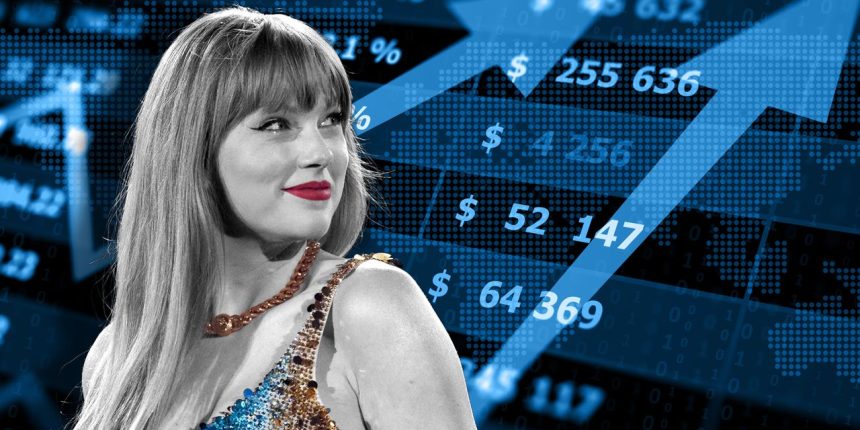As a longtime Taylor Swift fan, Kat Mahon always knew she would attend the artist’s much-anticipated “Eras Tour” this year. But little did Mahon think she would help push the American economy forward in the process.
That might seem like more than a slight exaggeration, but it’s not completely removed from the truth. Mahon spent at least $10,000 on tickets, travel and concert merchandise as part of her Swift sojourn, which took her to 11 concerts in the New York metro area, Philadelphia and Los Angeles.
It was a financial burden for the 25-year-old public-relations specialist who lives with her parents in New Jersey. “My friend said, ‘That’s money you could have spent on an apartment,’ ” Mahon says.
Bu it was the kind of blowout experience Mahon felt she couldn’t miss, saying, “It was very emotionally fulfilling.”
This was a year defined by such fulfillment, as Swift created a wave of hysteria that could be likened to the early days of Beatlemania. And with that came a wave of tour-related spending from Mahon and countless other Swifties — some $5 billion in total, according to the survey firm QuestionPro — that went far beyond the hundreds of thousands of tickets sold to the artist’s 50-plus U.S. concerts.
Call it Taylornomics, as some already have. Or Swiftonomics, if you prefer. Either way, it was a force to be reckoned with. And it served as a proxy of sorts for the consumer mindset in 2023.
Beyond Swift, Americans just kept spending this year, despite early predictions of doom and gloom for the economy as interest rates surged and despite warnings by experts that the U.S. would tip into a recession by the summer. It did not, and the U.S. stock market rebounded as a result.
Americans forked over money on everything from trips to restaurant meals and designer handbags — a “revenge spending” trend that followed years of pandemic-related isolation and limitations.
Things reached a fever pitch in July, when consumer spending, which accounts for more than two-thirds of the U.S. economy, jumped by 0.9%, the biggest increase in months, according to a Commerce Department report. In August, consumer spending increased another 0.4%.
It’s enough to raise a very MarketWatch-y question: Did Taylor Swift and the revenge-spending consumer play a part, large or small, in the U.S. stock market, as measured by the S&P 500
SPX,
realizing a solid total return of more than 10% so far in 2023? We think so and have put Swift on this year’s MarketWatch 50 list of the most influential people in markets.
Of course, correlation should not imply causation — but still. The S&P 500 sank 7.8% from its first-quarter high to 3,858 on March 13, its lowest close in 2023, amid recession fears. Four days later, Swift launched her “Eras Tour” in Glendale, Ariz. By the time she hit Arlington, Texas, at the end of March, the S&P 500 was above 4,100, and it kept rising as her tour crossed America. On the last date of her 2023 U.S. run at SoFi Stadium in Inglewood, Calif., on Aug. 9, the S&P 500 closed at 4,468. Since the U.S. tour stopped for the year, the S&P 500 has fallen to 4,238.
In effect, the market’s rise paralleled Swift’s ascendance as a pop juggernaut. It’s easy to write off such timing as mere fluke or coincidence. But some smart financial folks aren’t quite saying that. As for Swift herself, her team didn’t respond to an interview request for this story.
Certainly, the billions of dollars that Swift’s activity generated this year can’t be ignored, regardless of the fact that it’s just a fraction of the $27 trillion U.S. GDP. Swift even made a summer appearance in the Federal Reserve’s Beige Book, which cited her concert tour’s impact on travel and tourism spending in Philadelphia.
Swift also had a direct effect on some publicly traded companies. The stock of movie-theater chain AMC Entertainment Holdings
AMC,
rose for days in the lead-up to the October release of the “Eras Tour” concert film. The Swift picture generated a global opening weekend of $128 million, setting a record for a concert film. Footwear retailer Shoe Carnival
SCVL,
said it saw an “uptick in Western” items tied to the “whole Taylor Swift stadium concert thing” (apparently, Swift loves her boots and so do her fans).
“She’s a market mover for sure, but I think there’s been a perfect storm that allowed her to be a market mover,” says Thomas LaSalvia, a senior economist with Moody’s Analytics. He cites the fact that the U.S. economy “held up so much better” than expected and consumers were “willing to go out there and experience life like never before.”
That brings us to those Swifties who traveled across the country to attend shows and booked flights and hotels in the process. The Swift-related money spent on room nights alone totaled $208 million, according to STR, a hospitality and analytics company.
Swift has issued two albums this year: “Speak Now (Taylor’s Version)” in July and “1989 (Taylor’s Version)” just recently. Both are re-recordings of earlier albums created as part of Swift’s business-savvy effort to fully own her material.
Even Swift’s recent appearances at Kansas City Chiefs games — she’s been linked with tight end Travis Kelce — have resulted in surging sales for seats on the secondary market, to say nothing of broader boosts for the NFL. Mind you, Swift isn’t singing the national anthem or providing the halftime entertainment at these games. She’s just there to support Kelce.
The Swift economic story even extends to small-time entrepreneurs with no obvious connection to the pop star.
“What I think is interesting is the trickle-down effect to all these mom-and-pops that no one is talking about,” says David Schulhof, a veteran music-industry executive who is behind MUSQ
MUSQ,
an exchange-traded fund focused on the music business.
‘People will spend amazing money on a feeling worth feeling’
Nicolette Stessin has run a craft store in the Seattle area for 35 years, enjoying modest success along the way — that is, until Swift entered her life.
When the singer brought the “Eras Tour” to the city this past July, Stessin saw a 50% spike in business. The reason? Stessin’s store, called Beadworld, specializes in just that: beads for making jewelry. And Swift’s legion of fans often sport “friendship bracelets” that bear Swift-related messages and serve as a calling card to fellow Swifties.
Those fans came by the hundreds to Beadworld, seeking the necessary goods for designing their own bracelets. Even months after the Seattle dates, Stessin says sales at her 3,000-square-foot store are still way up as fans seem determined to sustain the get-happy vibe of the tour.
“Some of them enjoyed it so much they were making bracelets for the first day of school,” says Stessin, sounding both bewildered and bemused by the boom she’s enjoyed of late.
That’s especially true given the fact Stessin has never paid much attention to Swift’s music. “I like jazz and R&B,” she says.
Then, there’s Poppy + Rose, a breakfast and lunch spot in Los Angeles that enjoyed a $5,000 boost in sales on top of its $30,000 weekly average when Swift was in town for her summer concerts.
That’s enough money to help the establishment finally buy the new Apple
AAPL,
iPads it has long needed to run its operations, says Amanda Gomez-Viup, the restaurant’s general manager.
“Obviously, $5,000 in a week is incredible” for such a small business, she says of the boost.
Swift also figures prominently into another spending trend of 2023: the “Hot Girl Summer” movement that encompassed everything from the “Barbie” movie, which has grossed more than $1.4 billion worldwide to date at the box office, to Beyoncé’s blockbuster “Renaissance” tour.
In short, these were events that appealed heavily to women and showcased their buying power as a result. By one estimate, females constituted 80% of the audience at a Swift show in Texas.
Ellyn Briggs, a brands analyst with decision-intelligence company Morning Consult, says the movement driven by “Barbie,” Beyoncé and Swift constitutes its own perfect storm. And it’s one that will have lasting consequences, she contends.
This “has brought women’s spending to the forefront,” Briggs says.
Which is not to say all financial minds are in agreement that Swiftonomics is really a thing. Or at least a thing that has shaped the U.S. economy — and, in turn, the stock market — in any meaningful or ongoing way.
“The market does not respond to pop stars,” says Jeffrey Campbell, an economics professor at the University of Notre Dame.
Pick your argument. Some say that the money spent on all things Swift was money that would have been spent otherwise on something else — say, a Disney
DIS,
vacation or a Caribbean cruise — so there was no real gain for the economy.
Others say the spending on Swift to date this year — and many other discretionary events, passions and pursuits — will haunt the economy in the fourth quarter. Meaning someone who made that trip to see Swift in Los Angeles could be cutting back on holiday shopping — or on their shopping in general.
Holly Glisky, a 33-year-old Swift fan who shelled out more than $3,000 on a California trip from her home in Detroit to see Swift perform, admits she will be reducing her spending this fall as a result.
“For the remainder of the year, I’m being more mindful of what I’m spending on,” she says.
Economists have been suggesting a cool-down could be coming — and there’s still talk about a potential recession. It’s more than just Swift-related factors, of course. The resumption of student-loan payments, for example, may weigh far more heavily on spending.
“‘The market does not respond to pop stars.’ ”
— Jeffrey Campbell, University of Notre Dame
Even if the naysayers are right that Swift isn’t such a driving force in the economy — or even a symbol of the spending we’ve seen in recent months — that doesn’t mean she hasn’t changed the game in other ways, however. In terms of the music business alone, she’s leaving an incredible imprint, say those who follow or work in the industry.
For years, there’s been talk about how Live Nation Entertainment’s
LYV,
Ticketmaster subsidiary has done a poor job of serving fans and artists alike. But it took the Ticketmaster meltdown that resulted from Swift’s “Eras Tour” going on sale to prompt a Senate hearing on the issue.
At that hearing, Live Nation President Joe Berchtold defended his company, saying, “Primary ticketing companies, including Ticketmaster, do not set ticket prices, do not decide how many tickets go on sale and when they go on sale, do not set service fees. Pricing and distribution strategies are determined by artists and teams.”
Still, the damage could be done. Politico reported in July that the Justice Department may file an antitrust lawsuit against Live Nation and Ticketmaster. The Justice Department didn’t respond to a MarketWatch request for comment.
Holly Gleason, a veteran, award-winning music journalist who’s also worked in the industry, says Swift’s role in the matter is undeniable. And her influence extends further, Gleason notes, pointing to how the singer is likely inspiring a generation of female entrepreneurs of all kinds.
“Whether you’re a little girl who wants to start a business or write a song or publish a book … whatever it is you want to do, she’s the role model that says, ‘Hell, yeah,’ ” Gleason says.
Swift also sends a message of another kind, says Damian Bazadona, founder of the Situation Group, a New York marketing agency that specializes in live entertainment.
Swift didn’t amass a legion of fans for nothing, Bazadona explains. She did it by crafting hit after hit, from “Anti-Hero” to “We Are Never Ever Getting Back Together” to, yes, “Shake It Off.”
Then, she stitched those songs together in a three-hour, 15-minute “Eras Tour” concert that even the most hardened of critics praised as a stunning summation of her life’s work.
The inherent lesson is that you don’t have Taylornomics without talent.
“You got to put on a good show,” Bazadona concludes. “People will spend amazing money on a feeling worth feeling.”
Indeed, the best news for the stock market may be that while the “Eras Tour” is done in the U.S. for 2023, it will resume in October 2024, starting with Swift’s performance in Miami. Meanwhile, Swift is continuing the international leg of her tour in Argentina next month, having already played Mexico in August.
For her part, Mahon, the New Jersey fan who already spent $10,000 attending Swift concerts, is looking to keep the party going. She’s already made plans to attend the “Eras Tour” stop in Vienna next summer and may add the tour’s closing European date in London as part of the same sojourn, leaving time for some sightseeing along the way.
“I do want to make a trip out of it,” Mahon says.
Read the full article here




